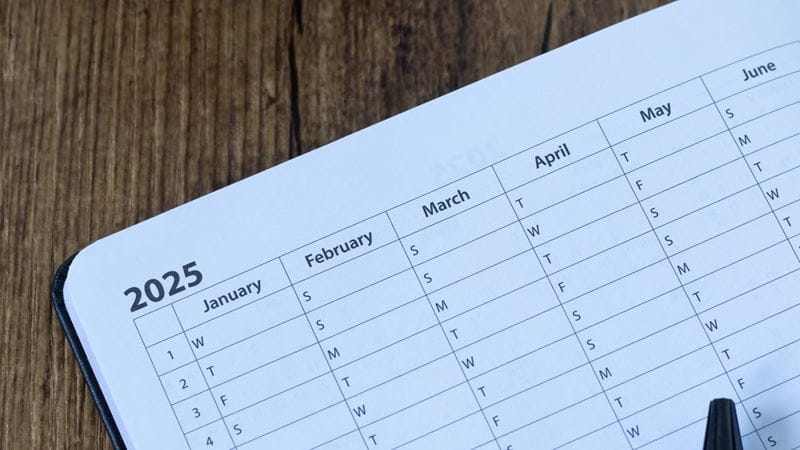
This article is for general guidance only and is not financial or professional advice. Any links are for your own information, and do not constitute any form of recommendation by Saga. You should not solely rely on this information to make any decisions, and consider seeking independent professional advice. All figures and information in this article are correct at the time of publishing, but laws, entitlements, tax treatments and allowances may change in the future.
As 2025 gets under way, now’s the perfect time to get yourself financially fit for the year ahead. By grabbing the reins in January you’ll be in a much better position to understand and manage your spending and set yourself on the right path for the coming year.
With that in mind, here are our top financial jobs to do this January.
There’s no putting it off any longer. If you need to do a tax return, now’s the time to file it, and pay the bill for any tax you owe HMRC for the 2023/24 tax year.
You have until 31st January to submit and pay, or face an immediate £100 fine and interest.
There’s a strong chance you’ll have received at least one gift that wasn’t exactly to your taste. If so, you may be wondering what to do with it beyond chucking it in a cupboard.
Your options are to return it, sell it or give it away.
Many retailers offer extended return periods in January for items bought between October and late December. This means you may well be able to return it – the downside is that, unless the giver thoughtfully included a gift receipt, you will have to diplomatically ask for proof of purchase.
“A receipt is the easiest way to demonstrate proof of purchase. But if that’s not available, a bank statement showing the transaction will suffice in most cases,” says John Roberts, a partner at law firm Austin Lafferty Solicitors.
Be aware that if the gift was bought using a card, the refund must go to the same card used in the transaction, so the person who gave the gift will need to arrange.
If the thought of asking the giver for a receipt makes you feel uncomfortable, you could consider donating the gift to your local charity shop, or selling it online using a platform such as Facebook Marketplace or Vinted.
Alternatively, if you think it’s a gift someone else might appreciate, you could always store it away and regift it – just be sure to note who it was from to avoid any potential embarrassment further down the line.
The energy price cap, set by regulator Ofgem, rose 1.2% on 1 January – the second price rise this winter. This means the average household energy bill now stands at £1,738 a year.
Ideally you’d have submitted a meter reading to your energy supplier around 31 December to make sure any estimates for energy used in December are not charged under the January higher rates. (If you have a working smart meter, you don’t need to do this.)
The combination of rising prices and plunging temperatures means January is the perfect time to get on top of your bills. Elise Melville, an energy specialist at comparison website Uswitch.com, suggests keeping a close eye on the latest available deals, as there are currently several tariffs that are cheaper than the January price cap. You might want to consider a fixed deal – where the rate charged for the energy you use is fixed for typically 12 or 18 months. This can shelter you from further increases as the year progresses.
“Fixed deals have been returning to the market in recent months, with competitive options from both the Big Six and smaller suppliers. So it’s important to get back in the habit of running an energy comparison when your fixed deal ends,” she says.

If you’re planning to buy an expensive electrical item in the January sales, consider paying by credit card, says Rachel Springall, a spokesperson at comparison website Moneyfactscompare. A credit card provides additional protection if your goods don’t arrive, work as expected, or you’re a victim of fraud.
Consider signing up to a new credit card to benefit from a 0% interest purchase deal, so you have the option of spreading the cost over several months without paying any interest. If you’ve racked up debt on credit cards from festive spending that you’re struggling to repay, a 0% balance transfer could help. This will give you a reprieve on interest charges while you make in-roads into clearing the debt.
“Keep notes on when any 0% offers expire. It’s vital to keep up with repayments. Making minimum monthly repayments should only really be a temporary measure. Be sure to prioritise paying off any debts that are being charged interest,” adds Springall.
Perhaps you’ve built up piles of receipts for purchases long-forgotten, or you have a drawer full of financial paperwork you’ve been meaning to sort out. January is a great time to do that.
When it comes to receipts, it depends on the item. If it’s something you’ve been meaning to return because you never use it or it’s the wrong size, after 30 days (unless there is an extended returns period for Christmas), the retailer would be unlikely to return or exchange the item.
But you might want to hang on to receipts for longer if you think there’s a chance that the item could develop a fault. This particularly applies to electrical items or white goods, but can be other things too – in law, anything you buy is expected to last for a reasonable length of time. (If it’s within six months, the shop must prove the item wasn’t faulty when they sold it – after that, the onus is on you to prove it was).
Lisa Webb, a consumer law specialist at the consumer group Which?, recommends keeping some form of proof of purchase for expensive white goods – such as washing machines, dishwashers and fridge-freezers – for six years and holding onto any warranty documents for the length of the warranty, in case it develops a fault and you need to request a replacement.
“If you're worried about losing a paper receipt, it can be helpful to take a photo of it on your phone and store the image in case you ever need to refer back to it,” she adds.
It might be the last thing on your mind, but now’s actually a great time to pick up cut-price Christmas cards, decorations, crackers and gifts for 2025 as retailers clear out unsold Christmas stock.
Buying early can also help you spread out the cost of Christmas, rather than doing all your spending towards the end of the year.


Discover our easy ways to take control of your finances, from doing your tax return to assessing your savings.

How to avoid common pitfalls when buying used products

From energy to food to transport, we reveal what's expected to happen to prices over the coming year.

/mature-couple-looking-at-taxes.jpg?la=en&h=650&w=1400&hash=5CFABEEDC751F26D56DD3E85749E3C36)

Find out the different types, the pros and cons, and how much income you might get.